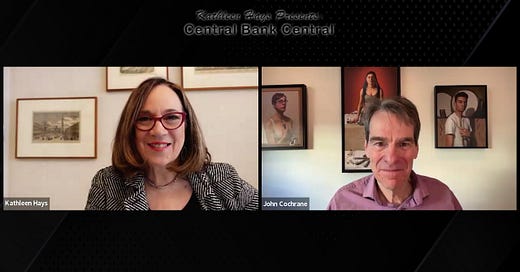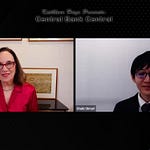John Cochrane is long known for thinking outside of the box and not being afraid to ruffle other economists’ feathers in his Grumpy Economist blog where he provides “news and views from a free market point of view.” A Stanford Hoover Institution economist for nearly a decade, his groundbreaking book “The Fiscal Theory of the Price Level” challenges traditional views of what drives inflation arguing that government spending ultimately is the lynchpin, if not the actual cause. This is a torch he carried to the recent American Economics Association Conference where he challenged conventional monetary policy views with his fiscal theory of the price level argument.
Now, John, in his latest missive, is sending a challenge out to President Trump and his economic team as they move forward an agenda of tariffs, deportations, extended tax cuts, and industrial policy he says “seems straightforward but limited:”
”My advice: Think much bigger. Yes, these will be a first year agenda, but also use that time to lay the ground work for transformational changes. What will be Trump’s legacy? Focus on changing how things get done, not just the policy answers which can get overturned. In many cases, just letting the weeds grow will work better than trying to reform dinosaurs.
“We are at an inflection point. The progressive left is discredited. Voters consider the “elites” running the country for the last few decades to be completely incompetent. We look around and our public life looks like a hoarder’s house. A counter-revolutionary wave is sweeping the globe, from Javier Milei to Giorgia Meloni to Pierre Poilievre. This is potentially bigger than the Reagan-Thatcher revolution. But just where this wave will lead is still an open question. You can set that agenda.”
So get ready for a red hot Grumpy Economist view of the road ahead.
John Cochrane: The really big Picture 00:01:10:14 - 00:01:43:15
…as my colleague Neil Ferguson calls it, the vibe shift has been very big. It's not just an election, really. The progressive orthodoxy we've lived under for the last ten years has fallen apart. And nobody believes the various emperor has no clothes, things that we were all told to say. And this is a moment where in the U.S., as around the world, big changes are happening in what our governments do and what we expect of them.
Back to common Sense: peasants and pitchforks 00:02:31:05 - 00:02:56:04
…so at this inflection point, the US, the peasants with pitchforks are clearly mad and have recognized the incompetence of the elites leading us. Where will we go? That's not so obvious. Leaders Challenge Channel a basic discontent, a basic desire for common sense for Let's get things back to normal. But that doesn't tell us exactly where we go.
The permanent and the ephemeral 00:03:25:01 - 00:03:59:02
Trump undid 78 Biden executive orders in 5 minutes. Well, but Trump's executive orders can be undone in another 5 minutes, four years from now. So certainly building to more permanence, I hope for. Oh, but also there are larger changes afoot than even the sorts of things Trump is talking about.
A tariff is just a sales tax so don’t sweat the small stuff 00:05:37:19 - 00:06:33:13
The tariff is just a sales tax. California hasn't fallen into the ocean. Sales taxes are good. But you know, they're not they're not that terrible either. Small and in moderation. Big tariffs… tariffs in the 1930s were clearly a terrible idea… my advice, my unsolicited advice to Trump's economic team is that we are in a time of great turmoil. So pick the things that you can make progress on that have great upsides rather than get into a big fight about tariffs.
The real tariff issue 00:08:38:12 - 00:09:00:22
If you want to think about tariffs, the issue is not what they do to overall inflation. The issue is what they do to inefficiency, to, you know, there's a part I need from Canada and I can't get it anywhere else.
The real bottom line is underscored elsewhere not by tariffs 00:09:23:04 - 00:09:49:05
…it's fundamentally mistake to think about inflation as the sum of relative price changes, whether it causes everything to go up depends on whether the Fed and the Treasury give us enough money to buy everything at higher prices. Is there a reaction of monetary and fiscal policy that creates inflation or not? So it's really up to the Fed and the Congress, whether it creates inflation or not.
Dueling visions and their consequence 00:06:33:15 - 00:07:14:11
<Some think> .…that the job of the government, that we should have a large, energetic central federal government who raises tariff barriers, other protective barriers, does industrial policy, subsidizes various industries, tries to close a big wall around the U.S. and bring back sort of a museum of the 1950s… And if that gives economic stagnation, they say, well, so what we need community, we need America, we need society. It is a vision that's been tried many times before.
How we really win! 00:07:41:05 - 00:08:02:08
We win the war, whatever war. We're fighting against China by us being great, not by putting up barriers so that they can be great in the rest of the world. But they can't touch us here.
Marginal tax rates matter most 00:10:39:04 - 00:11:51:15
As an economist, what matters in taxes is the marginal rate. If you earn an extra dollar, how much of that do you get to keep? So lowering marginal rates is a good thing. But even these tax cuts are relatively small. Remember, in 1986, Reagan lowered marginal tax rates from 70% to 28%. Here's a tax cut. And actually they get rid of so many loopholes that they made more money out of it eventually, not right away. Now, that's a growth enhancing tax.
So...set the marginal tax rate to zero and tax consumption! 00:11:51:15 - 00:12:14:20
This April 14th, I ask each of your listeners to look down at the stack of papers in front of them and say, Really, is this the best way to raise revenue for the government for its needed spending? . If you want to raise revenue for the government without doing economic damage, throw out the income tax, throw out the estate tax, excise tax, throw out everything else you put in a simple consumption tax. It can be a sales tax, it can be a value added tax. You can raise it through the federal income tax system. The tax on corporations should be zero. Why? Because corporations just pass that on as higher prices and lower wages… tax people; tax their consumption.
Energy, carbon, the US Vs Europe and Nuclear 00:15:17:04 - 00:15:40:22
Their energy prices are three or four times even. The U.S. energy prices, they're industria de industrializing. They're realizing what a catastrophic mistake this all was. There is a sensible climate policy, if you want one, the simple carbon tax and get rid of all the regulations. But the regulations on energy have just ruined large parts of our economy to no discernible benefit… Nuclear is not drilling, but nuclear is the answer to enormous amounts of carbon-free power un-regulated. The system killed it in the 1970s. Just get out of the way. So the sentiment is good. But rather than drill, baby, drill, I might have said Get out of the way, baby, get out of the way.
The Washing machine hokey pokey/lighting 00:17:46:15 - 00:18:06:22
Washing machines have to use four gallons of water to do a whole load. It's impossible to do a whole load with four gallons of water. The first Trump administration, he rescinded those energy efficiency requirements. Biden put them right in again. The problem is he rescinds them. The manufacturers aren't going to change anything because they know four years from now they'll be back in again. Bring back stuff that works, please. Well, I'll tell you, the one I really want rescinded is I want the incandescent lights back.
Preparing for the next shock 00:21:54:21 - 00:22:17:03
<In a shock> you've got to spray some money around and a shock like that. I think they've wildly overdid it. But that's why we got big inflation. Well, if you don't want the next shock to give a big inflation, you got to think now about do you have a plan B other than spray money around, bail out every financial institution stimulates and people checks… <beyond that…> Now we're in a tremendous crisis. So the US's ability to borrow our fiscal capacity is is really the issue.
Supply shocks: the way we did the things we did 00:32:13:02 - 00:32:40:16
Respond to supply shocks by giving everyone money because standard economics make it <the best policy>. I don't think it's true, but standard economics says the prices that go down are very damaging, especially if wages have to go down. That's bad. Markets don't like wages to go down. So if you get your choice between one up and one down or send everything up, send everything in. Standard economic advice is respond to a supply shock with monetary and fiscal policy that causes the inflation. That's what we say happened in the 1970s. We tell undergraduates happen in the 1970s. That's what tell small countries who are having the IMF tell small countries, oh, you have a terms of trade shock, devalue your currency, inflate, don't let any price go down, make sure everything goes up.
John H. Cochrane
Biographical Sketch May 2024
John H. Cochrane is the Rose-Marie and Jack Anderson Senior Fellow of the Hoover Institution at Stanford University.
His monetary economics publications include the book The Fiscal Theory of the Price Level and articles on monetary policy. His finance publications include the book Asset Pricing, and articles on dynamics in stock and bond markets, the volatility of exchange rates, the term structure of interest rates, the returns to venture capital, liquidity premiums in stock prices, the relation between stock prices and business cycles, and option pricing. He has also written articles on macroeconomics, health insurance, time-series econometrics, financial regulation, and other topics. He was a coauthor of The Squam Lake Report. He writes occasional Op-eds, mostly in the Wall Street Journal, and blogs as “the Grumpy Economist” at grumpy-economist.com. He recently created the Coursera online course “Asset Pricing.”
Cochrane is also a Senior Fellow of the Stanford Institute for Economic Policy Research (SIEPR), Professor of Finance and Ecoomics (by Courtesy) at Stanford GSB, a Research Associate of the National Bureau of Economic Research, and an Adjunct Scholar of the CATO Institute. He is a past President and Fellow of the American Finance Association, and a Fellow of the Econometric Society. He has been an Editor of the Journal of Political Economy, and associate editor of several journals including the Journal of Monetary Economics, Journal of Business, and Journal of Economic Dynamics and Control. He was a director of the NBER asset pricing program. Awards include the Bradley Prize, the APEE Adam Smith award, the TIAA-CREF Institute Paul A. Samuelson Award for Asset Pricing, the Chookaszian Endowed Risk Management Prize, the Faculty Excellence Award for MBA teaching and the McKinsey Award for Outstanding Teaching.
Before coming to Hoover, Cochrane was the AQR Capital Management Distinguished Service Professor of Finance at the University of Chicago Booth School of Business, where he taught the MBA class “Advanced Investments” and a variety of PhD classes in Asset Pricing and Monetary Economics. Cochrane earned a Bachelor’s degree in Physics at MIT, and earned his Ph.D. in Economics at the University of California at Berkeley. He was at the Economics Department of the University of Chicago before joining the Booth School in 1994, and visited UCLA Anderson School of Management in 2000-2001.
Outside of academic pursuits Cochrane is a competition sailplane pilot, and enjoys cycling, windsurfing, skiing, and other outdoor activities.













Share this post